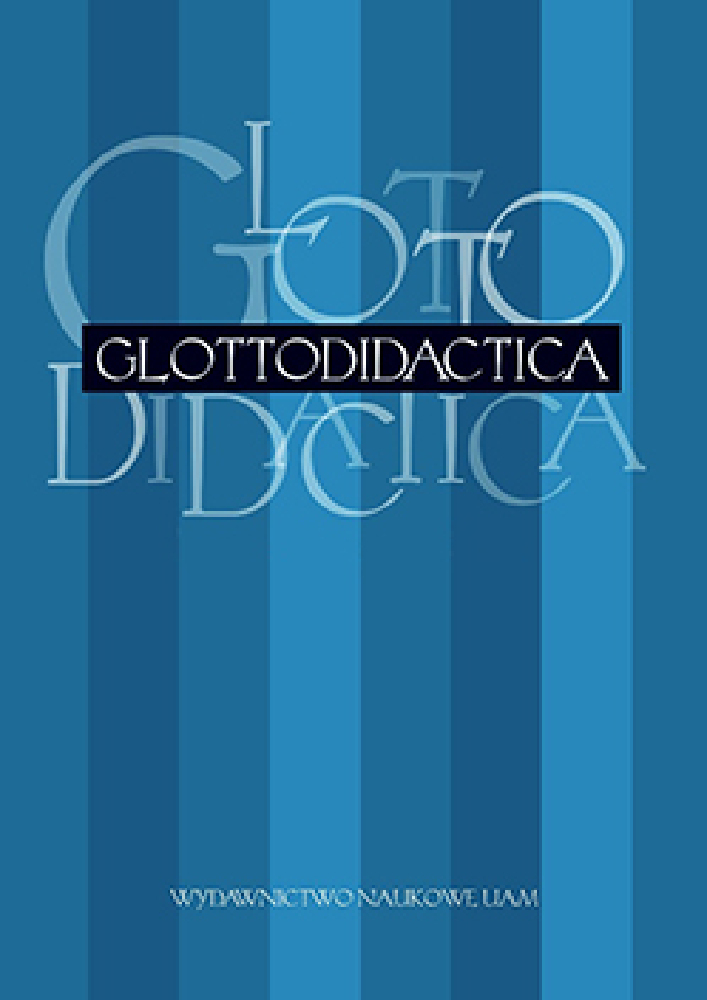Abstract
The dissemination of results has always been an important aspect of the research process. The translation plays here an increasingly important role. In view of the fact that the languages of science differ significantly, that the scientific style is simultaneously distinguished by many personal, universal and cultural features, the translation appears not to be an easy undertaking. Following the Galtung’s concept of intellectual styles we present the distinguishing features of the Teutonic and Saxonic style on the example of German and English language.References
Ammon, U., 1991. Die internationale Stellung der deutschen Sprache. Berlin–New York: de Gruyter.
Ammon, U., 1998. Ist Deutsch noch internationale Wissenschaftssprache? Berlin–New York:de Gruyter.
Arntz, R., Picht, H., 1995. Einführung in die Terminologiearbeit. Hildesheim–Zürich–New York: Georg Olms.
Barczaitis, R., Arntz, R., 1998. Fachübersetzung in den Naturwissenschaften und in der Technik. In: Hoffman, L., Kalverkämper, H., Wiegand, H.E. (Hrsg.). Fachsprachen. Ein internationales Handbuch zur Fachsprachenforschung und Terminologiewissenschaft. Berlin–New York: de Gruyter, 792-800.
Clyne, M., 1991. The Sociocultural Dimension: The Dilemma of the German-speaking Scholar. In: Schröder, H. (Hrsg.). Subject-oriented Texts: Languages for Special Purposes and Text Theory. Berlin–New York: de Gruyter, 49-67.
Clyne, M., 1993. Pragmatik, Textstruktur und kulturelle Werte. Eine interkulturelle Perspektive. In: Schröder, H. (Hrsg.). Fachtextpragmatik. Tübingen: Narr, 3-18.
Clyne, M., 1996. Inter-cultural Communication at Work: Cultural Values in Discourse. Cambridge–New York: Cambridge University Press.
Duszak, A., 1997a. Analyzing digressiveness in Polish academic texts. In: Duszak, A. (Hrsg.). Culture and styles of academic discourse. Berlin–New York: de Gruyter, 323-342.
Duszak, A., 1997b. Cross-cultural academic communication: a discourse-community view. In: Duszak, A. (Hrsg.). Culture and styles of academic discourse. Berlin–New York:de Gruyter, 11-40.
Fiedler, S., 2012. Zur Kulturspezifik der Wissenschaftskommunikation. In: Brosch, C., Fiedler, S. (Hrsg.). Fackkommunikation – interlinguistische Aspekte. Beiträge der 21. Jahrestagung der Gesellschaft für Interlinguistik e.V., 18. – 20. November 2011 in Berlin. Berlin: GIL, 39-50.
Fleischmann, E., Schmitt, P.A., 2011. Fachsprachen und Übersetzung. In: Kittel, H., House, J., Schultze, B. (Hrsg.). Übersetzung: Translation: Traduction. HSK 26.1. Berlin: de Gruyter, 531-542.
Galtung, J., 1985/2000. Struktur, Kultur und intellektueller Stil. Ein vergleichender Essay über sachsonische, teutonische, galische und nipponische Wissenschaft. In: Wierlacher, A. (Hrsg.). Das Fremde und das Eigene: Prolegomena zu einer interkulturellen Germanistik.
München: iudicium, 151-193. (1981. Structure, culture and intellectual style. An essay comparing saxonic, teutonic, gallic and nipponic approaches).
Hejwowski, K., 2006. Kognitywno-komunikacyjna teoria przekładu. Warszawa: PWN.
Jopkiewicz, K., 2013. J?zyk to nie wszystko: wiedza kulturo- i realioznawcza a jako?? przek?adu ustnego. http://www.konferencje-spnjo.polsl.pl/download/jopkiewicz-k-jezyk-tonie-wszystko-wiedza-kulturo-i-realioznawcza-a-jakosc-przek.pdf (abgerufen am:15.02.2014).
Kalverkämper, H., 1992. Die kulturanthropologische Dimension von ‘Fachlichkeit’ im Handeln und Sprechen. Kontrastive Studien zum Deutschen, Englischen, Französischen,Italienischen und Spanischen. In: Albrecht, J., Baum, R. (Hrsg.). Fachsprache und Terminologie in Geschichte und Gegenwart. Tübingen: Narr, 31-58.
Kautz, U., 2000. Handbuch Didaktik des Übersetzens und Dolmetschens. München: Iudiucium.
Kielar, B.Z., 2013. Zarys translatoryki. Warszawa: IKL@. Koller, W., 2004. Einführung in die Übersetzungswissenschaft. Wiebelsheim: Quelle & Meyer.
Kozłowska, Z., 2007. O przekładzie tekstu naukowego (na materiale tekstów językoznawczych).Warszawa: WUW.
Kußmaul, P., 2011. Die Übersetzung gesisteswissenschaftlicher Texte aus sprachwissenschaftlicher Perspektive. In: Kittel, H., House, J., Schultze, B. (Hrsg.). Übersetzung: Translation: Traduction. HSK 26.1. Berlin: de Gruyter, 636-641.
Lehman, I.M., 2013. Rhetorical approaches to academic writing: the case of polish and angloamerican academic writing. http://www.retoryka.edu.pl/files/far2_2013_art5.pdf (abgerufen am: 18.02.2014).
Macpherson, R., 2012. English for Academic Purposes. Warszawa: PWN.
Markl, H., 1986. Die Spitzenforschung spricht englisch. In: Kalverkämper, H., Weinrich, H. (Hrsg). Deutsch als Wissenschaftssprache. Tübingen: Narr, 20-25.
Marszałek, L., 1986. Edytorstwo publikacji naukowych. Warszawa: PWN.
Plaxco, K.W., 2010. The art of writing science. http://www.smb.wsu.edu/docs/defaultsource/wotd/the-art-of-writing-science.pdf?sfvrsn=2 (abgerufen am: 19.02.2014).
Scherer, H., 1992. Kosmos – Sprache – Fachsprache. In: Albrecht, J., Baum, R. (Hrsg.).Fachsprache und Terminologie in Geschichte und Gegenwart. Tübingen: Narr, 17-30.
Schleiermacher, F., 1813. Ueber die verschiedenen Methoden des Uebersetzens. http://users.unimi.it/dililefi/costazza/programmi/2006-07/Schleiermacher.pdf (abgerufen am:19.02.2014).
Stolze, R., 1999. Die Fachübersetzung: eine Einführung. Tübingen: Narr.
Tabakowska, E., 2001. Kognitywne podstawy języka i językoznawstwa. Kraków: TAiWPN Universitas.
Trumpp, E.C., 1998. Fachtextsorten kontrastiv: Englisch – Deutsch – Französisch. Tübingen:Narr.
Whorf, B.L., 2002. Język, myśl i rzeczywistość. Warszawa: Wydawnictwo KR (1956. Language,Thought and Reality).
Ylönen, S., 1993. Stilwandel in wissenschaftlichen Artikeln der Medizin. Zur Entwicklung der Textsorte „Originalarbeiten” in der Deutschen Medizinischen Wochenschrift von 1884 bis 1989. In: Schröder, H. (Hrsg.). Fachtextpragmatik. Tübingen: Narr, 81-98.
Żmudzki, J., 2013. Holizm funkcjonalny w perspektywie translatoryki antropocentrycznej. In: Lingwistyka Stosowana 8, 177-187.
License
Authors
Authors of texts accepted for publication in Glottodidactica are required to complete, sign and return to the Editorial team’s office the Agreement for granting a royalty-free license to works with a commitment to grant a CC sub-license.
Under the agreement, the authors of the texts published in Glottodidactica grant Adam Mickiewicz University in Poznań a non-exclusive, royalty-free license and authorize the use of Attribution-NoDerivatives 4.0 International (CC BY-ND 4.0) Creative Commons sub-license.
The authors retain the right to the free disposal of the work.
Users
Interested Internet users are entitled to use works that have been published in Glottodidactica since 2016, under the following conditions:
▪ attribution – obligation to provide, together with the distributed work, information about the authorship, title, source (link to the original work, DOI) and the license itself.
▪ no derivatives – the work must be preserved in its original form. Without the author's consent, it is not possible to distribute the modified work in the form of translations, publications, etc.
Copyrights are reserved for all texts published before 2016.
Miscellaneous
Adam Mickiewicz University in Poznań retains the property right as a whole (layout, graphic form, title, cover design, logo etc.).
Privacy statement
The names and email addresses published on this journal site will be used exclusively for the purposes declared by this journal and cannot be used for any other purpose or by any other party.




